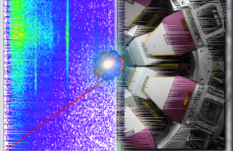87 void Copy(TObject&)
const override;
88 virtual void Copy(TObject&,
bool copywave)
const;
89 virtual void CopyWave(TObject&)
const;
90 void Clear(Option_t* opt =
"")
override;
92 void Print(Option_t* opt =
"")
const override;
93 virtual void Print(std::ostream& out)
const;
109 void SetCharge(
const Int_t& temp_charge) {
fCharge =
static_cast<Float_t
>(temp_charge) +
static_cast<Float_t
>(gRandom->Uniform()); }
111 virtual void SetCfd(
const uint32_t& val) {
fCfd =
static_cast<Float_t
>(val) +
static_cast<Float_t
>(gRandom->Uniform()); }
112 virtual void SetCfd(
const Int_t& val) {
fCfd =
static_cast<Float_t
>(val) +
static_cast<Float_t
>(gRandom->Uniform()); }
133 virtual double GetEnergy(Option_t* opt =
"")
const;
139 Option_t* opt =
"")
const;
160 const char*
GetName()
const override;
static TChannel * GetChannel(unsigned int temp_address, bool warn=false)
void SetKValue(const Short_t &temp_kval)
!
virtual Float_t GetCharge() const
!
Double_t SetEnergy(const double &energy) const
double GetTimeSinceTapeMove() const
virtual UInt_t GetAddress() const
!
TDetectorHit(const int &Address=0xffffffff)
virtual void SetCfd(const Float_t &val)
!
virtual Long64_t GetTimeStampNs(Option_t *opt="") const
virtual Long64_t GetTimeStamp(Option_t *="") const
virtual TVector3 GetPosition() const
!
virtual double GetEnergy(Option_t *opt="") const
EPpgPattern GetPPGStatus() const
virtual Short_t GetKValue() const
!
void SetWaveform(const std::vector< Short_t > &val)
!
virtual void ClearTransients() const
const char * GetName() const override
!
std::vector< Short_t > fWaveform
const std::vector< Short_t > * GetWaveform() const
!
TTransientBits< UChar_t > fBitFlags
virtual UShort_t GetArrayNumber() const
! Simply returns the detector number, overwritten for detectors that have crystals/segments
virtual Int_t GetCrystal() const
!
Long64_t fCycleTimeStamp
!
virtual void SetCfd(const uint32_t &val)
! this function automatically randomizes the integer provided
virtual Float_t Charge() const
!
Float_t fCharge
charge collected from the hit
virtual Double_t GetEnergyNonlinearity(double energy) const
virtual int GetChannelNumber() const
!
TChannel * GetChannel() const
!
virtual Int_t GetTimeStampUnit() const
!
Double_t fTime
! Calibrated Time of the hit
void SetCharge(const Float_t &temp_charge)
!
bool TestHitBit(EBitFlag flag) const
virtual TVector3 GetPosition(Double_t) const
!
UInt_t fAddress
address of the the channel in the DAQ.
void AddWaveformSample(const Short_t &val)
!
Double_t fEnergy
! Energy of the Hit.
static bool CompareEnergy(TDetectorHit *lhs, TDetectorHit *rhs)
void Clear(Option_t *opt="") override
!
virtual void SetCfd(const Int_t &val)
! this function automatically randomizes the integer provided
virtual Int_t GetDetector() const
!
virtual Double_t GetTimeNonlinearity(Long64_t mytimestamp) const
virtual Float_t GetCfd() const
!
virtual Int_t GetSegment() const
!
void Copy(TObject &) const override
!
virtual Double_t GetTime(const ETimeFlag &correct_flag=ETimeFlag::kAll, Option_t *opt="") const
Returns a time value to the nearest nanosecond!
void SetHitBit(EBitFlag, Bool_t set=true) const
Short_t fKValue
integration value.
virtual bool HasWave() const
!
virtual size_t WaveSize() const
!
Bool_t IsEnergySet() const
void SetAddress(const UInt_t &temp_address)
!
static TVector3 fBeamDirection
void SetCharge(const Int_t &temp_charge)
! this function automatically randomizes the integer provided
Bool_t IsChannelSet() const
static TVector3 * GetBeamDirection()
Long64_t fTimeStamp
Timestamp given to hit in ns.
Long64_t GetCycleTimeStamp() const
Float_t fCfd
CFD time of the Hit.
TDetectorHit(TDetectorHit &&) noexcept=default
Double_t SetTime(const Double_t &time) const
virtual void Add(const TDetectorHit *)
!
virtual void AppendTimeStamp(const Long64_t &val)
!
virtual void SetTimeStamp(const Long64_t &val)
!
virtual void CopyWave(TObject &) const
!
friend std::ostream & operator<<(std::ostream &out, const TDetectorHit &hit)
void Print(Option_t *opt="") const override
!
Bool_t TestBit(T bit) const



